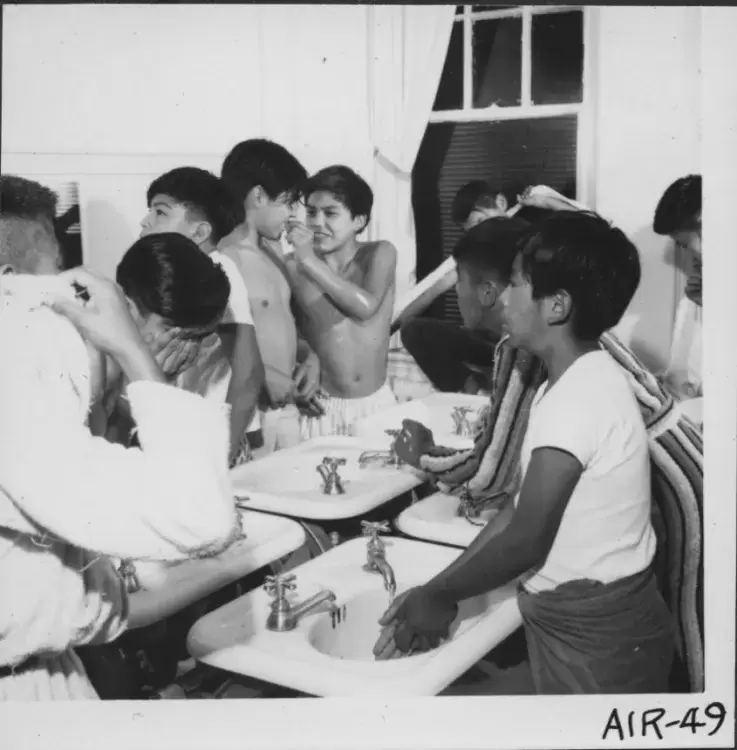At the Alberni Indian Residential School in 1969, a headstrong nine-year old boy misses his family. His grandparents live so close that all the lonely little boy has to do is sneak away unnoticed, cross the ‘Orange Bridge’ and walk two kilometers down River Road to the comfort of home. And he did it, often.
This is the story of Mitchell Joseph, a Hupacasath boy sent to Alberni Indian Residential School where he stayed until his death in 1969.
Fifty years later, those who knew the boy recall the tragedy the Joseph family suffered. Everyone knew Mitchell ran away every chance he could, and sometimes police would pick him up in places as far away from the school as Cherry Creek.
Perhaps he didn’t want to be seen in the open on the wide street next to the river. Maybe he tried to find a less open route home.
A pair of sisters from Ahousaht couldn’t make it to the Reclaiming Lost Souls of AIRS Healing Event hosted by Tseshaht First Nation in late September. But a Ha-Shilth-Sa story about it triggered painful, haunting memories of Mitchell Joseph for the sisters.
Norma Tom (nee Charlie) and Flo Charlie were senior girls at AIRS back in May 1969. As such they were sometimes required to supervise the younger children.
“I remember seeing him that morning, before breakfast,” Norma shared.
On May 26, 1969, Mitchell ran away yet again and was returned to AIRS by the RCMP.
“Mrs. Williams was a mean ass, oh my God!” said Flo. “When she’d lose it – it was bad.”
The sisters recalled that little Mitchell ran away quite often, and took cruel punishment from the supervisor.
“The day he ran she really hit him around and belittled him,” said Flo, referring to Mrs. Williams.
Later that day an Ahousaht boy came running for help. Randy Louie, now deceased, was the same age as Mitchell. He tried to find someone to help save Mitchell.
The Charlie sisters remember running downstairs to see what was wrong. They saw Mitchell’s lifeless body hanging by his neck from the towel dispenser; the type that had a continuous sheet of fabric looped through a wall-mounted device. It was too late to save him.
“In my heart I knew it wasn’t right – there was no stool or chair under this boy, I felt he was left hanging there,” said Flo.
The coroner ruled the death an accident that occurred at approximately 5:15 p.m. on May 26, 1969.
Two weeks later an inquiry into the death of Mitchell Joseph found that the death was attributed to accidental hanging and recommended that towel facilities at Alberni Indian Residential School be improved. It is not known whether or not the towel dispensers at AIRS were replaced.
A subsequent inquiry took place involving another death of an AIRS student three years later. The results were similar.
In November 1972, David Edwards of Ditidaht died in a motor vehicle accident at Cameron Lake. According to Clyde Wale, who is an AIRS survivor and was also in the accident, the boys were roused from their sleep by a female supervisor who said they were going on a picnic at Parksville.
It didn’t make sense because it was night time in November. Wale recalled the chaos of the accident, with bodies flying everywhere as the bus they were in tumbled over the road. He said they hit the rock wall.
David Edwards, was eight years old at the time of his death. The coroner’s report indicates that he was thrown out of the bus, suffering fatal head injuries. The accident occurred Nov. 11, 1972 at about 7:45 in the evening. It didn’t mention a picnic.
The inquiry that followed less than two weeks later ruled the death an accident, “and that no blame attaches to anyone.”
“The jury recommend (sic) that the driver of any passenger vehicle belonging to the Federal Government and used in connection with the Indian Affairs Residences be required to have a Class 4 license,” reads the Inquiry report, dated Nov. 23, 1972.
John Thomas, the boy’s father, signed his son’s death certificate. He brought his son home to Nitinaht Lake for burial.
The Charlie sisters, traumatized by what they witnessed, recalled being isolated from the other children with instructions not to speak of what they saw. The sisters say the memories are painful and they block some of them.
“It’s so hard to talk about,” said Norma. “It just hurt so much to see him and it still gets me. I’m sorry, I’m just nothing but tears.”
Dora Armstrong (nee Unger) works for Hupacasath First Nation. Back in the ‘60s she lived on River Road next door to the Joseph family.
“He was such a darling boy; priceless, a cutie pie,” she shared.
Dora recalled playing with the Joseph siblings…Nelson, Susie, Andrew and Stewart.
“Susie died in a car accident…they are all gone now except for Stewart and another sister,” she told Ha-Shilth-Sa.
Even the house that Mitchell ran to is gone. It has long since been replaced by cheap DIA prefab houses.
The Charlie sisters honoured the memory of Mitchell Joseph during a canoe journey dedicated to his memory.
“We dedicate our Tribal Journey paddles to something significant,” said Flo, adding that they met with members of the family and Hupacasath community several years ago.
According to Mitchell Joseph’s records, he was laid to rest at an ‘Indian Cemetery’ in Port Alberni. He likely lies close to his beloved grandparents – never to be taken away again.







